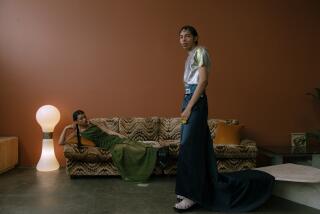The Office Radical
- Share via
Take a look around your workplace. Is your chair comfortable? Your desk tidy, with papers neatly filed? Too bad. You are not prepared for the 21st century.
Studying the future is a top priority at Haworth Inc. of Holland, Mich., a major manufacturer of office furniture. Teams of designers, engineers, psychologists and others in Haworth’s R & D Ideation Group are analyzing the changing patterns of work and shaking up our idea of the office.
Too often today we are sitting when we should be standing or even bouncing, they maintain. So they’re coming up with a prototype for radical chairs that encourage movement.
And stashing away ongoing projects into file cabinets may be smothering the creative process, their research has shown. So they are designing workstations that arrange materials spatially and support the thinking process.
“Of all the American furniture companies, Haworth has been the most uninhibited in its research and development,” said Chee Pearlman, editor of I.D., a design magazine. “You may or may not agree with their view of the future, but you have to be impressed with their work.”
Long known as a producer of office cubicles, Haworth first broke the mold in 1994 with a line of mobile office furniture called Crossings. Now they’ve turned out a series of prototypes called Furniture for What’s Next. The latest concepts were unveiled earlier this month in San Jose at a conference on workplaces of the future.
The Haworth designs included Flo and Eddy, two flashy workstations for knowledge workers incorporating “cognitive ergonomics.” It’s a new way of organizing everything you’re working on, explained design manager Brian Alexander. “People need to see their stuff.”
According to the principles of cognitive ergonomics, the entire scope of your current work needs to be exposed, creating an arrangement that resembles your brain.
To this end, Flo consists of a surfboard-like worktable with a wire mesh display area, aimed at providing a visual connection to works in process, making documents and work tools more accessible and easier to recall. Its flat panel monitors are treated as big Post-it notes. For storage, Flo substitutes open, coral-like cells for files or boxes.
Eddy is a tiered work space designed to display reference materials that otherwise end up in stacks. Eddy’s curvilinear fiberglass tiers and gooseneck fittings accommodate smaller papers and act as “mental scratch pads.”
Equally novel is the work being done by a team for “next generation seating,” who went into their research advocating comfort but were redirected by their findings.
“The sedentary work style of ‘Sit down and get comfortable’ is counterproductive,” explained manager Steve Nemeth. “If you are too relaxed or immobilized, you become less alert and productive.”
Working on the premise that moving around stimulates office workers and enables them to perform better, the team came up with several concepts. The pony encourages users to move and work simultaneously. The pogo is a spring stool that frees users to work around, up and through tasks. And the palette, a modified exercise bike, allows users and their tasks to move together.
None of Haworth’s concept products is ready for sale, and most workers and their bosses aren’t ready for a pony and Flo’s Post-its, company spokesman Chuck Hartlage acknowledged. “It’s an ongoing design process. For our customers, it’s a vote of confidence that we are thinking ahead and when they get ready to make a change, we’ll be there.”
More to Read
Inside the business of entertainment
The Wide Shot brings you news, analysis and insights on everything from streaming wars to production — and what it all means for the future.
You may occasionally receive promotional content from the Los Angeles Times.










